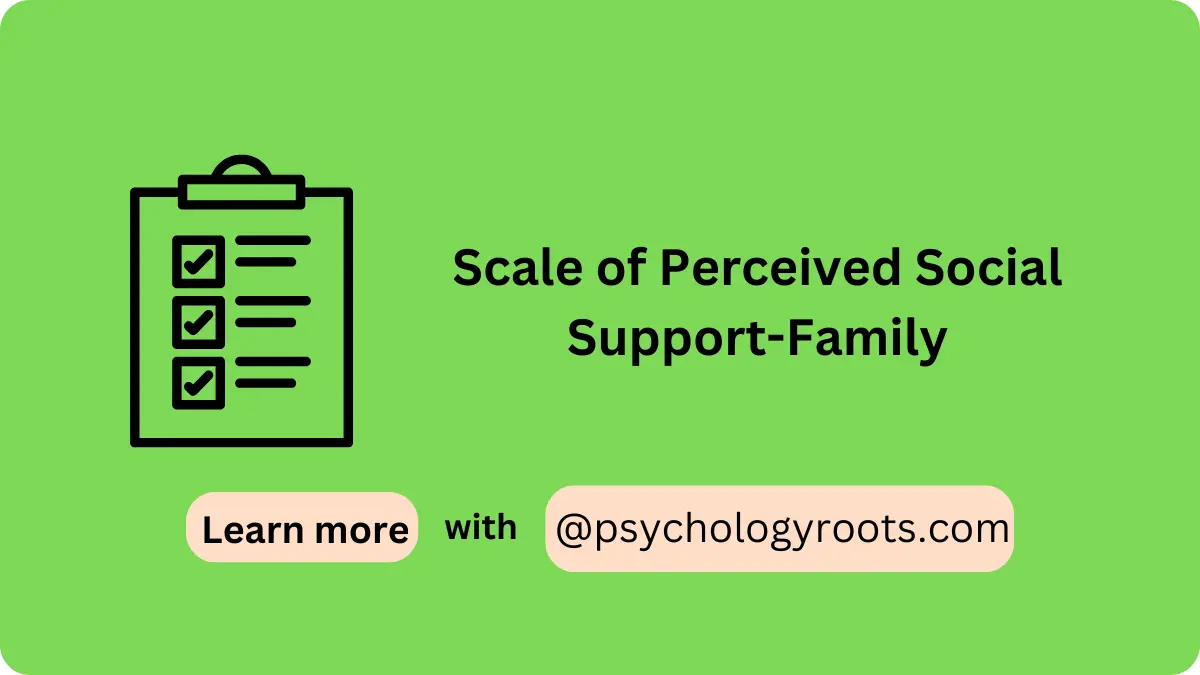Table of Contents
Scale of Perceived Social Support-Family
Here in this post, we are sharing the “Scale of Perceived Social Support-Family”. You can read psychometric and Author information. We have thousands of Scales and questionnaires in our collection (See Scales and Questionnaires). You can demand us any scale and questionnaires related to psychology through our community, and we will provide you with a short time. Keep visiting Psychology Roots.
About Scale of Perceived Social Support-Family
Scale Name
Scale of Perceived Social Support-Family
Author Details
Canty-Mitchell and Zimet (2000)
Translation Availability
English

Background/Description
The Scale of Perceived Social Support-Family (SPSS-F) assesses the extent to which individuals perceive social support within their family environment. This brief yet reliable measure focuses on the emotional and practical support family members provide, serving as an essential tool in understanding familial dynamics and their impact on psychological well-being.
Designed for adolescents aged 12–18 (Grades 7–12), the scale has proven effective in evaluating support perceptions across various cultural and socio-economic contexts. Its high reliability makes it a robust tool for research and clinical settings.
Administration, Scoring and Interpretation
- Target Population: Adolescents aged 12–18 (Grades 7–12).
- Format: Self-report questionnaire.
- Instructions:
- Briefly explain the purpose of the scale and ensure confidentiality.
- Provide clear instructions about the response format:
- Rarely or Never = 1
- A Little Bit = 2
- Sometimes = 3
- A Good Part of the Time = 4
- Always = 5
- Emphasize the importance of honest responses to obtain accurate results.
- Allow respondents enough time to complete the scale without pressure.
- Scoring Procedures
- Record responses for all 4 items.
- Assign scores according to the Likert scale (1 to 5).
- Sum all item scores to calculate the total score.
- Interpret the total score: higher scores indicate greater perceived social support from family.
Reliability and Validity
- Reliability: Alpha reliability reported at 0.91, with a recent study on 1,360 inner-city youth finding an alpha of 0.90, confirming excellent internal consistency.
- Validity: Derived from established theoretical frameworks and validated across diverse populations, ensuring its effectiveness in measuring family social support perceptions.
Available Versions
04-Items
Reference
Canty-Mitchell, J., & Zimet, G. D. (2000). Psychometric properties of the Multidimensional Scale of Perceived Social Support in urban adolescents. American journal of community psychology, 28(3), 391-400.
Important Link
Scale File:
Frequently Asked Questions
Q1: What does the Scale of Perceived Social Support-Family measure?
It measures individuals’ perceptions of the level of social support they receive from their family.
Q2: Who can use this scale?
The scale is designed for adolescents aged 12–18 (Grades 7–12).
Q3: How is the scale scored?
Responses are scored on a 5-point Likert scale (1 to 5). The total score is the sum of all item scores, with higher scores reflecting greater perceived family support.
Q4: Is permission required to use this scale?
No, permission is not required to use this scale.
Q5: How reliable is this scale?
The scale has a high reliability, with alpha scores reported at 0.91 and 0.90 in different studies.
Disclaimer
Please note that Psychology Roots does not have the right to grant permission for the use of any psychological scales or assessments listed on its website. To use any scale or assessment, you must obtain permission directly from the author or translator of the tool. Psychology Roots provides information about various tools and their administration procedures, but it is your responsibility to obtain proper permissions before using any scale or assessment. If you need further information about an author’s contact details, please submit a query to the Psychology Roots team.
Help Us Improve This Article
Have you discovered an inaccuracy? We put out great effort to give accurate and scientifically trustworthy information to our readers. Please notify us if you discover any typographical or grammatical errors.
Make a comment. We acknowledge and appreciate your efforts.
Share With Us
If you have any scale or any material related to psychology kindly share it with us at psychologyroots@gmail.com. We help others on behalf of you.